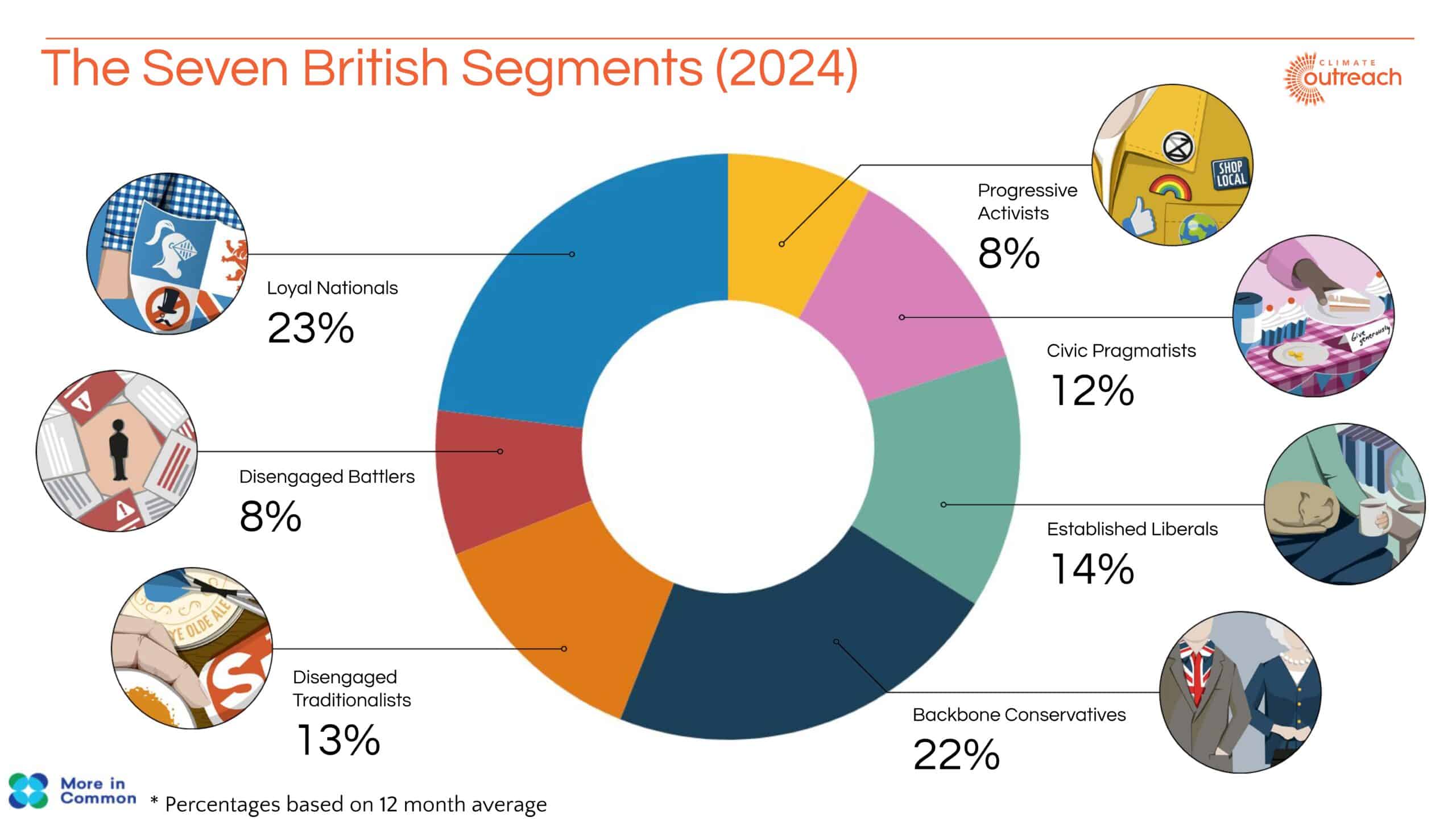What is Britain Talks Climate?
People in Britain care about climate change and want to tackle it as a society.
Britain Talks Climate exists to help us better understand and engage with people’s priorities, questions and concerns. It helps us tell clearer, more compelling climate stories that resonate with people of different values and backgrounds.
It reveals that there is support for climate leadership across the population and that climate action offers the possibility of hope and reconnection. It outlines common ground and differences in how people are thinking and feeling about climate change.
Britain Talks Climate features seven different segments of the British population, based on More in Common’s Core Beliefs model. It provides a shared and strategic understanding of the British public and identifies ways to to engage across the whole of society.
Launch webinar
 Progressive Activists – Vocal and passionate, politically active but pessimistic about the direction society has taken, climate change is central to Progressive Activists’ identity and politics. They are despairing about governments’ moral failings on the issue, which they believe will make all other challenges and inequalities worse.
Progressive Activists – Vocal and passionate, politically active but pessimistic about the direction society has taken, climate change is central to Progressive Activists’ identity and politics. They are despairing about governments’ moral failings on the issue, which they believe will make all other challenges and inequalities worse.
 Backbone Conservatives – Conservative, patriotic and optimistic, Backbone Conservatives take pride in tangible success stories about British environmental achievements and care deeply about food, farming and the rural economy. But they are more sceptical about grand claims of global leadership, or the ‘virtue signalling’ of (what they sometimes see as) symbolic lifestyle changes.
Backbone Conservatives – Conservative, patriotic and optimistic, Backbone Conservatives take pride in tangible success stories about British environmental achievements and care deeply about food, farming and the rural economy. But they are more sceptical about grand claims of global leadership, or the ‘virtue signalling’ of (what they sometimes see as) symbolic lifestyle changes.
 Civic Pragmatists –Moderate and tolerant, Civic Pragmatists are anxious about the future, with climate change contributing to that fear. They try to follow a low-carbon lifestyle, but feel demotivated by a lack of political ambition on climate change and other social issues. Reflecting their pragmatic nature, they are likely to look past their opinion of the government of the day and support progressive climate policies when they see them.
Civic Pragmatists –Moderate and tolerant, Civic Pragmatists are anxious about the future, with climate change contributing to that fear. They try to follow a low-carbon lifestyle, but feel demotivated by a lack of political ambition on climate change and other social issues. Reflecting their pragmatic nature, they are likely to look past their opinion of the government of the day and support progressive climate policies when they see them.
 Established Liberals –Confident and comfortable, Established Liberals have a global outlook driven more by their professional networks than a sense of solidarity with communities around the world. They don’t necessarily view climate change as something that will affect them personally, but they do want to hear how low-carbon solutions will drive economic resilience and growth.
Established Liberals –Confident and comfortable, Established Liberals have a global outlook driven more by their professional networks than a sense of solidarity with communities around the world. They don’t necessarily view climate change as something that will affect them personally, but they do want to hear how low-carbon solutions will drive economic resilience and growth.
 Disengaged Battlers –Feeling unheard and unrepresented, Disengaged Battlers are nevertheless broadly convinced of the need to take action on climate change. However, they do not yet believe the transition will benefit them, and are too busy surviving from day to day to give it more of their attention.
Disengaged Battlers –Feeling unheard and unrepresented, Disengaged Battlers are nevertheless broadly convinced of the need to take action on climate change. However, they do not yet believe the transition will benefit them, and are too busy surviving from day to day to give it more of their attention.
 Disengaged Traditionalists –Disillusioned and sceptical, Disengaged Traditionalists recognise tangible environmental risks like air pollution, but are far from ‘sold’ on the need for action on climate. They are more likely to see it as a problem for foreign governments to deal with.
Disengaged Traditionalists –Disillusioned and sceptical, Disengaged Traditionalists recognise tangible environmental risks like air pollution, but are far from ‘sold’ on the need for action on climate. They are more likely to see it as a problem for foreign governments to deal with.
 Loyal Nationals –Traditional and proud to be British, Loyal Nationals feel threatened and are galvanised by issues such as crime, immigration and terrorism. They believe the UK is already living with the reality of climate change, but they understand it as an issue linked to localised (rather than global) inequality and environmental degradation. Their relatively high political participation is driven by moral outrage about a system that supports corporate greed over everyday working people.
Loyal Nationals –Traditional and proud to be British, Loyal Nationals feel threatened and are galvanised by issues such as crime, immigration and terrorism. They believe the UK is already living with the reality of climate change, but they understand it as an issue linked to localised (rather than global) inequality and environmental degradation. Their relatively high political participation is driven by moral outrage about a system that supports corporate greed over everyday working people.
Understand commonality and difference on climate across the seven British segments
The seven British segments reveal a public that is fractured but not deeply polarised, with climate change emerging as an issue that offers the possibility of hope and reconnection.
All are concerned about climate change, but there are some key headline differences between the segments when it comes to their views and feelings on climate change:
• Strength of feeling: For Progressive Activists, climate change is one of the most important issues facing the world. For the disengaged segments, it can feel less urgent day-to-day.
• Thinking more globally or locally: Some people are more likely to think about climate change in terms of complex global systems or economics. These people are more likely to be Progressive Activists or Established Liberals. Most other segments are more galvanised by what’s going on closer to home, and by changes they can see and feel.
• Trust in institutions, like government: All segments are pretty disillusioned with politics right now, and want governments to lead on climate change. But for some, like Loyal Nationals and the Disengaged segments, there’s a more deeply-held cynicism about ‘elites’. They need to see and believe that things can and are changing, not just be told that they might.
• Income and wealth: Established Liberals, Backbone Conservatives and Civic Pragmatists tend to be the wealthiest segments, and the most likely to enthusiastically adopt new technology. Loyal Nationals and the two Disengaged segments are the most likely to be on lower incomes.
Who can use Britain Talks Climate?
We hope Britain Talks Climate is helpful for anyone who wants to understand how different people think and feel about climate change. We have included in it key recommendations for policymakers and communicators. If you are thinking about talking about climate, we hope it can help you.
An obvious next step is mapping the audience segments onto different places and constituencies. This is work we would love to be part of. If you would like to partner with us or can help support us to do this, please get in touch.
Project background
The original 2020 Britain Talks Climate findings come from a collaboration between Climate Outreach, the European Climate Foundation (ECF), More in Common and YouGov. The original research included a 10,385 survey of British adults, 12 focus groups and 35 in-depth interviews. Subsequent surveys of 2,010 British adults, followed by 2,060 British adults were conducted among recontacted subsets of the initial survey sample.
Climate Outreach led the Britain Talks Climate project with the support of ECF, integrating their issue expertise with More in Common’s model of understanding people’s core beliefs. All project partners collaborated in the analysis of the field research undertaken by YouGov. Britain Talks Climate follows on from More in Common’s Britain’s Choice report released in October 2020.
Research has continued since 2020, to provide up-to-date insights for climate communicators and campaigners. In 2024, the Britain Talks Climate toolkit was updated following a 5,100 person survey of British adults (with nationally representative samples in Wales and Scotland for the first time; each 1,000 person samples respectively), and seven focus groups with each of the seven British segments. The 2024 research was a collaboration between Climate Outreach, More in Common and the European Climate Foundation.
Continue exploring
Sign up to our newsletter
Thank you for signing up to our newsletter
You should receive a welcome email shortly.
If you do not receive it, please check your spam folder, and mark as 'Not Spam' so our future newsletters go straight to your inbox.

